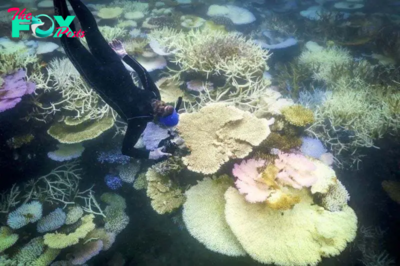Technology
Chinese scientists develop innovative cooling material for buildings to cut carbon emissions
In a world experiencing rapid warming, effectively cooling our homes during sweltering summer months with reduced energy consumption and lower greenhouse gas emissions is crucial for meeting carbon reduction targets.
A team of Chinese researchers has crafted an innovative biomass-derived material using DNA, the genetic blueprint of life. This aerogel demonstrates a remarkable ability to reduce ambient temperatures by 16 degrees Celsius on sunny days, even under intense solar radiation.
The researchers combined DNA and gelatin into an ordered layered aerogel structure that converts absorbed ultraviolet light into visible light to surpass 100 percent solar reflectance, yielding exceptional radiative cooling.
The adoption of biopolymer-based radiative cooling material helps mitigate environmental pollution, according to the study published on Friday in the journal Science.
Moreover, these aerogels, efficiently fabricated on a large scale through water welding, demonstrate remarkable reparability, recyclability and biodegradability.
This aerogel material is poised to revolutionize the energy efficiency of urban architecture as an outer protective layer, said the paper's corresponding author Zhao Haibo from Sichuan University.
The simulation outcomes of the study have demonstrated a substantial reduction in annual energy expenditure in cooling for buildings across all modeled cities.
The novel aerogel holds promise for significantly reducing carbon emissions and energy consumption and paves the way for innovative and sustainable radiative cooling materials in the future, Zhao said.
China has committed to the dual carbon goals of peaking carbon emissions by 2030 and achieving carbon neutrality by 2060. ■
-

 Technology11h ago
Technology11h agoTransplanting insulin-making cells to treat Type 1 diabetes is challenging − but stem cells offer a potential improvement
-

 Technology17h ago
Technology17h agoShould I worry about mold growing in my home?
-

 Technology17h ago
Technology17h agoBlurry, morphing and surreal – a new AI aesthetic is emerging in film
-

 Technology1d ago
Technology1d agoSpaceX’s Starship advances in spaceflight despite booster landing failure | The Express Tribune
-

 Technology1d ago
Technology1d agoGreat Barrier Reef faces 'significant coral deaths' following recent climate events | The Express Tribune
-

 Technology1d ago
Technology1d agoMeta to challenge India's data-sharing restrictions between WhatsApp, other apps | The Express Tribune
-

 Technology1d ago
Technology1d agoMerlin inks £85m deal to bring Minecraft attractions to UK, US parks by 2026-2027 | The Express Tribune
-

 Technology1d ago
Technology1d agoRethinking screen time: A better understanding of what people do on their devices is key to digital well-being

















